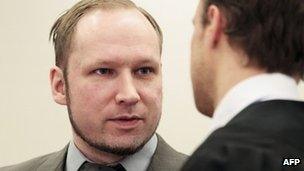Anders Behring Breivik says insanity report is lies
- Published

Breivik has argued he should either be put to death or acquitted
Anders Behring Breivik has told his trial in Oslo that a psychiatric report finding him insane in relation to the 77 killings he carried out was a "lie".
Breivik said his position was "entirely logical". There was "not the slightest possibility I will be judged insane".
Two reports came to opposing views on his sanity. The court's ruling on this will determine whether Breivik is sent to jail or into psychiatric care.
The court earlier heard more testimony from victims of the Oslo bombing.
Breivik, 33, admits to killing 77 people in Oslo and on Utoeya island last July but denies criminal responsibility.
'Death or acquittal'
The BBC's Lars Bevanger in Oslo says Wednesday's evidence is crucial from Breivik's point of view as it will determine the type of his detention.
The five-strong panel of judges will make the ruling on his sanity at the verdict in July.
Breivik is arguing against the first psychiatric report, which found him legally insane and suffering from paranoid schizophrenia, and in favour of the second, which concluded he was accountable for his actions.
He told the court that the psychiatrists compiling the first study had failed to understand he had deliberately suppressed his emotions to prepare for attacks.
He said: "It is not me who is described in that report... Everything I presented was entirely logical. I don't see the slightest possibility I will be judged insane."
Breivik said those who compiled the report lacked the experience to analyse someone who had committed an "act of political violence", and that they were in shock because they had spoken to him soon after the attacks.
He also said they might have been pressured by Norway's government to keep his ideology from getting out.
Our correspondent says the issue of sanity is key for Breivik, who wants to show his actions were motivated by a political doctrine.
Breivik has said committal to a psychiatric ward would be a fate worse than death and he would do "anything to prevent" it.
Breivik himself has argued he should either be put to death or acquitted.
Our correspondent says most people in Norway who have been following the trial expect Breivik to be found sane, given the way he has conducted himself in court.
If so he could face 21 years in jail, which can be extended if he is thought a continuing danger to society. He would face compulsory psychiatric care if found insane.
Earlier, the court heard more testimony from those injured in the Oslo blast and more forensic evidence of the explosion.
Passer-by Eivind Dahl Thoresen described seeing flames out of the corner of his right eye, lifting his hands to his face and being thrown backwards.
Deafened, he said he tried to help another injured man before noticing he was himself bleeding heavily and lay down, shouting for help.
The prosecution also read a statement on behalf of another blast victim, who lost a limb.
Our correspondent says these are some of the first tales of the many victims of the July attacks and over the next eight and a half weeks of the trial, there are sure to be many more harrowing stories to come.
He says that in a few weeks time there will be 69 more coroner's reports - one for each of the deaths at the Labour Party youth camp on Utoeya island.
Relatives of victims sobbed during the evidence on both Tuesday and Wednesday.
Breivik watched the witnesses without any visible emotion.
On Wednesday he said if anyone should apologise for the killings it should be the ruling Labour Party.
"But instead they continue in the same direction, so the grounds for struggle are unfortunately even more relevant now than before July 22."
Breivik spent the first week of the trial giving his own version of events, saying his plan was to kill as many people as possible.
He says he was defending Norway from multiculturalism.